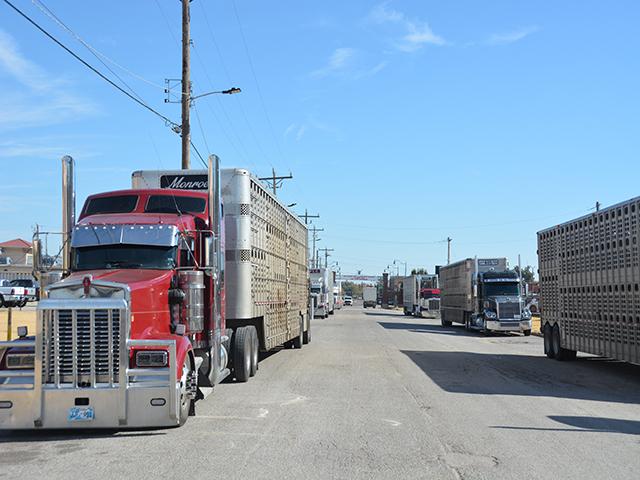CA Defies Trump on EV Truck Mandate
California Defies Congress, Continues EV Truck Mandate Despite Voided EPA Waivers
LINCOLN, Neb. (DTN) -- The state of California continues to move toward banning internal combustion engines and pushing an electric-vehicle mandate, even though Congress voided necessary waivers granted to the state by the Biden administration, the Trump administration alleges in two new complaints to intervene filed in two federal lawsuits last week.
The Trump administration alleges in the U.S. District Court for the Northern District of Illinois as well as in the U.S. District Court for the Eastern District of California, that the state of California continues to enforce heavy-duty truck emissions regulations as part of the state's Clean Truck Partnership with truck manufacturers, although the U.S. Environmental Protection Agency waivers have been pulled.
The three California rules include the Advanced Clean Truck rule that forces manufacturers to sell an increasing percentage of so-called zero-emissions trucks, the Omnibus Low Nox rule that sets strict emissions standards for diesel engines, and the Advanced Clean Fleets rule that requires large truck fleets to transition to zero-emissions vehicles.
The Trump administration's lawsuit argues those rules are superseded by the Clean Air Act. Under the CWA states are not allowed to set their own vehicle emissions standards and are required to have an EPA waiver to enforce stricter state standards.
Congress used the Congressional Review Act to void waivers for the Advanced Clean Truck rule and the Omnibus Low Nox rule but did not have a waiver for the Advanced Clean Truck rule, according to the lawsuit.
"In a stunning act of defiance, the state of California is attempting to use its own vehicle and engine emissions standards through a so-called 'Clean Truck Partnership' to ban internal-combustion engines in heavy-duty trucks, notwithstanding duly enacted federal statutes specifically providing that those regulatory standards are preempted," the administration said in the Illinois complaint.
"And it harms ordinary citizens from coast to coast by diminishing the use of fossil-fuel powered heavy-duty trucks, which are the lifeblood of our interstate commerce -- as they transport vast amounts of goods and materials every day that keep businesses operating, consumers stocked and prices low."
The original lawsuit filed in the Illinois court was by the American Free Enterprise Chamber of Commerce against engine manufacturers and Steven S. Cliff, executive officer of the California Air Resources Board.
P[L1] D[0x0] M[300x250] OOP[F] ADUNIT[] T[]
The lawsuits could have major implications for farmers across the country who depend heavily on trucking for their operations. Electric trucks have "limited range and payload" compared to diesel trucks, the Illinois lawsuit said, which is critical when moving commodities across rural distances.
Several other states already have adopted the California approach and the farm state of Illinois, according to the lawsuit, also is considering adoption.
"CARB continues to threaten substantial regulatory fines against any manufacturer who sells vehicles in California without a CARB certificate, notwithstanding the fact that the Clean Air Act expressly prohibits such certifications in the absence of a waiver," the Illinois complaint said.
In addition, last week the Federal Trade Commission closed its investigation into whether several truck and engine manufacturers and their trade association violated antitrust laws by entering the Clean Truck Partnership.
President Donald Trump signed legislation in June 2025 that revoked the EPA waivers to California.
Four manufacturers including Daimler Truck, International Motors, PACCAR and Volvo Group, which control up to 99% of the heavy-duty truck market, joined the Clean Truck Partnership and agreed in 2023 to abide by the three California regulations talked about in the lawsuit.
The FTC announced last week that they received assurances from the four manufacturers that they view the regulations as "unenforceable" and that none of the companies would try to enforce the partnership's terms against another manufacturer.
"Importantly, the manufacturers also agree not to enter any restrictive agreement with a U.S. state regulator or government permitting cross-enforcement among competitors or containing an agreement to comply with regulatory limits a state has no authority to impose or enforce," the FTC said in a news release last week.
The four manufacturers sued the state of California in that second lawsuit in the U.S. District Court for the Eastern District of California. The Trump administration filed a complaint last week to intervene in that case.
The U.S. House of Representatives Committee on Energy and Commerce notified CARB in an Aug. 11, 2025, letter of its "illegal actions."
The four manufacturers said in their federal complaint filed in California, that the state threatened them with being placed on a "manufacturer purchasing restriction list" if they didn't comply with the rules of the Clean Truck Partnership.
That agreement, according to the manufacturers, prohibited the companies from challenging CARB regulations in court, filing requests for EPA preemption waivers, filing amicus briefs against California's regulations and supporting legal challenges to the regulations.
Read more on DTN:
"State AGs Challenge EV Truck Mandates," https://www.dtnpf.com/…
Todd Neeley can be reached at todd.neeley@dtn.com
Follow him on social platform X @DTNeeley
(c) Copyright 2025 DTN, LLC. All rights reserved.




